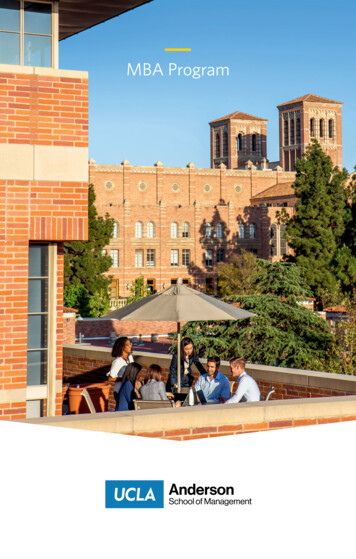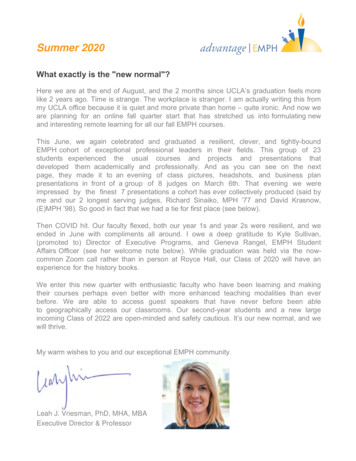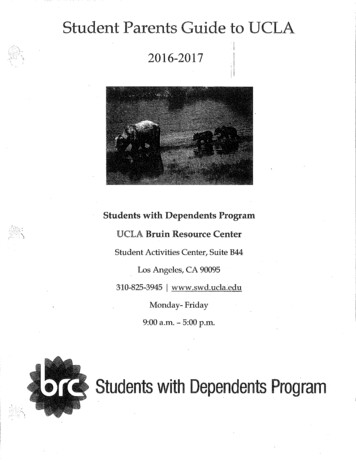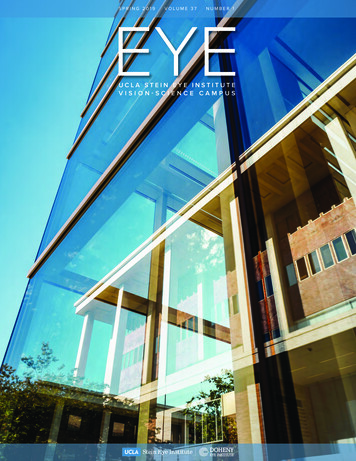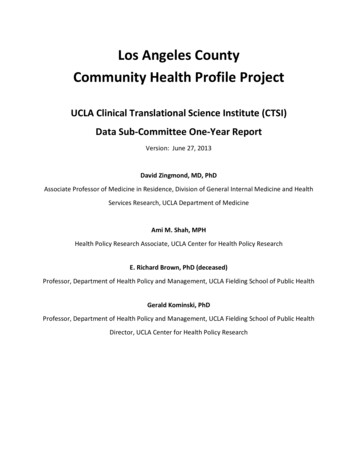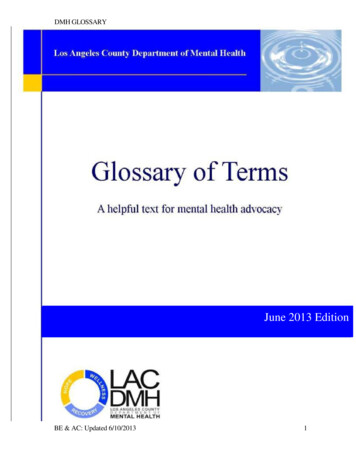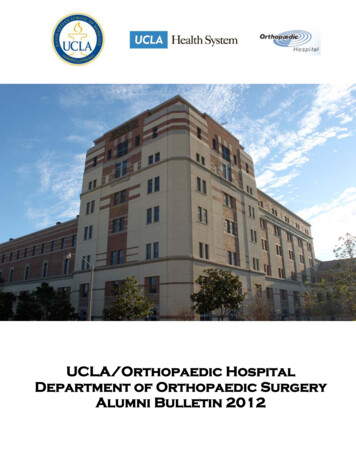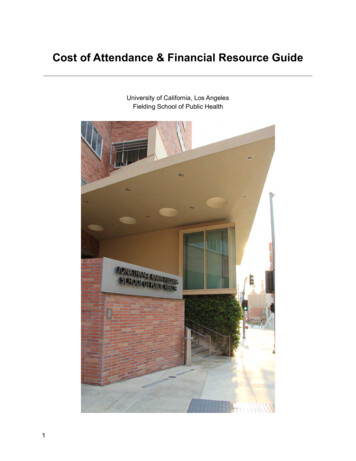
Transcription
Cost of Attendance & Financial Resource GuideUniversity of California, Los AngelesFielding School of Public Health1
Image by Paulina Sepulveda, FSPH 2021 AmbassadorTABLE OF CONTENTSPlanning For Your Graduate School Public Health Education . . . . 3FAFSA . .3UCLA Graduate Financial Aid . .3Types of Loans Available . .4UCLA Cost of Attendance . . .4Scholarships and Fellowships . .5Working While in School . .5Funding for PhD Students . . . .6Estimated Tuition Rates: Fielding School of Public Health . .7Budgeting for Graduate School . . .8Student Loans . 9Breaking Down the Budget Categories . . .9Other Costs to Consider . . 11Loans are Not as Intimidating as They May Seem . .11UCLA Provisional Award Letter (PAL) . . 13Annotated PAL . 14FSPH Student Tips . . .15Paying for School as an Out of State Student 17The Logistics for Out of State Students . .17Who Can Apply/ How to Apply for California Residency for Tuition Purposes . .17Strategies for Reducing Expenses and Managing Costs . 19Transportation .19Textbooks . .19Housing 19How to Have Fun in Los Angeles on a Budget/Free Activities/Entertainment .20Resources . . 21Contact Us .22Appendices . 232
PLANNING FOR YOUR GRADUATE SCHOOL PUBLIC HEALTHEDUCATIONWelcome to the Cost of Attendance and Financial Resource Guide for the University ofCalifornia Los Angeles (UCLA), Fielding School of Public Health (FSPH)! This guide was writtenby students and staff within the school to provide you with resources and support when planningfor graduate school. Planning and organizing your finances for graduate school may feeloverwhelming, but there are many resources at UCLA and FSPH to support your journey andfinancial wellbeing.There are many ways to fund your public health education as a graduate student. Students mayfeel overwhelmed when considering paying for graduate school, but UCLA and FSPH havemany resources to help. We want to help make your education affordable!Most students obtain funding from a variety of sources. It is important to consider all streams ofincome and financial assistance you may be able to receive and find to help supplement youreducation payments. Some students are heavily reliant on their personal savings, loans, familialsupport, their work, or things like fellowships and scholarships. All students fund their educationdifferently, but most students find success in utilizing a variety of different sources to pay fortheir education.Free Application for Federal Student Aid (FAFSA)The Free Application for Federal Student Aid (FAFSA) is used to determine your eligibility forfederal loans, work study, and need-based scholarships from FSPH. This form applies to oneacademic year, and must be completed every year of your education. If you are a US Citizen orpermanent resident you are eligible to complete this application.If you are not a US Citizen, but qualify for a nonresident tuition waiver under AB-540, make sureto complete the California DREAM ACT application.Both applications open October 1st and have a priority deadline of March 2nd. Do not postponefiling your application. To allow UCLA time to receive either of these applications, be sure toinput the UCLA school code: 001315.UCLA Graduate Financial AidThe financial aid package that you will receive, or Provisional Award Letter (PAL), is generatedby the UCLA Financial Aid Office based on information provided by students on the FAFSA. ThePAL will probably look very different from what you received as an undergraduate student. Atthe graduate school level there are no Federal Pell Grants or Cal Grants for residents of CA andany scholarships that you receive will not be included in this notice. As an FSPH incoming3
student your PAL will consist of student loans and work study, if eligible. This differs from anundergraduate financial aid package that typically consists of scholarships and other awardsoffered to you. It is important to note that graduate students no longer qualify for subsidizedloans, which will be further explained in the next section.Types of Loans AvailableGraduate students are eligible for federal direct unsubsidized loans and direct PLUS loans.These both differ from the subsidized loans you may have been offered during undergrad, asthe unsubsidized and PLUS loans both accrue interest as soon as the initial loan is dispersed.Loans are financial assistance that come from either the federal government or private lenders.Ensure that you know the terms and conditions of your loans before borrowing, as they all differ.The specifications of each type of loan can be found below: Federal Direct Unsubsidized Loans (5.28% interest for 2021-22):All students, regardless of need, are eligible to receive Federal Direct UnsubsidizedLoans. UCLA will determine how much you can borrow based on cost of attendance andother financial aid you receive. Students do not have to begin making payments until sixmonths after graduation. Graduate students are eligible to borrow up to 20,500 inunsubsidized loans. Federal Direct PLUS Loans (6.28% interest for 2021-22):Students are able to borrow up to the cost of attendance minus any other financial aidthat you are already receiving. Graduate students are eligible to borrow up to the cost ofattendance minus 20,500 to fill in the gap for Federal Direct PLUS loans. Private Loans (interest varies by private lender):Some students choose to borrow from a private lender instead of taking federal financialaid. The interest rates and repayment terms vary so it’s important to investigate theirinterest rates and repayment options.If you are receiving an internal or external scholarship, you must report this to the financial aidoffice, as this could reduce the amount of loans you are offered.UCLA Cost of AttendanceThe overall cost of attendance at UCLA includes tuition, fees, and expenses for housing, food,educational materials, and transportation. The cost of attendance is determined by yourresidency status and by the housing option you select on the financial aid application (commuterstudent living with family vs. student living independently). This figure, and sum of the previousexpenses, is what the Financial Aid Office uses to process aid eligibility and your awardpackage. Your UCLA financial aid package cannot exceed the cost of attendance. Werecommend for students to create a budget and compare the projected UCLA cost ofattendance with your own personal budget. Tuition and fees have been set and are fixed costs,yet items such as room/meals, personal fees, books and supplies, and transportation costs mayvary by each student’s budget.4
Scholarships and FellowshipsFSPH Scholarships: FSPH offers a variety of scholarships and fellowships for entering andcontinuing students. Newly admitted students are automatically considered for departmentaland schoolwide awards and are contacted individually if they are granted a scholarship. Awardsare made after students are accepted and even after students commit to attending UCLA, asfunding becomes available. Continuing students are also eligible to receive funding for theirsecond year of study, for their field studies practicum (MPH students) and for conference travel.Campus wide Scholarship Opportunities: UCLA Graduate Division offers over 600 scholarships,grants, fellowships, and postdoctoral awards. Use the search engine to find opportunities youmay be qualified for.External Scholarships: There are a variety of external scholarships available for students of alldegree types and programs, many based on your interests and past experiences. GraduatePeer Mentors are a resource for current and prospective students to help students search andprepare for external scholarships and fellowships. Make an appointment with a peer mentor tofind individualized opportunities!It is never too early to start seeking external scholarships. We often recommend thatstudents search for scholarships as they are applying to graduate school programs, asmany scholarships have deadlines before the start of the academic school year.Searching early and searching often will help boost your chances of securing funding.Although there are some internal sources of funding from the school, the number ofscholarships and fellowships are limited. This is why we recommend searching outsideof your department and FSPH to find additional opportunities.Working While in SchoolWorking at UCLA: Many of our students choose to work while in graduate school either on or offcampus. Working at UCLA, in particular, may be a great way to subsidize your education. Oncampus employment opportunities pay hourly salaries or offer a stipend and/or tuitionremission. Examples of these on-campus positions are listed below: Graduate Student Research Positions (GSR): Assist faculty with scholarlyresearch Teaching Assistantships (TA): Teach/co-teach courses, hold office hours, supportclass instruction and grading for regular faculty members Readers: Assist faculty members in grading and/or reading papers, exams,assignments Tutors: Provide individual or small group instruction*Note: International students can work up to 20 hours per week during the academicyear5
Incoming students can search for campus opportunities after they have submitted theirStatement of Intent to Register (SIR). TA positions may be found through the TA Marketplace,by contacting UCLA departments directly or through emails from FSPH. For masters students,GSR positions are most often located by contacting individual faculty members and after severalquarters at FSPH, or during the second year of study.Funding for PhD StudentsPhD students support their education through a variety of means including departmentalsupport, TA and GSR positions, participation in training grants, collaboration with externalorganizations, and external fellowships. The UCLA Graduate Division also offers fellowships fordoctoral students, including funding for summer research work and for the dissertation year.PhD students are also eligible to receive up to 1,000 for presentations at conferences.A complete list of financial resources can be found here.Image by Paulina Sepulveda, FSPH 2021 Ambassador6
ESTIMATED TUITION RATES: FIELDING SCHOOL OF PUBLIC HEALTHTuition and mandatory fees are set regardless of method of instruction (remote v. in-person).2021-2022 Public Health Tuition Rates (Including Fees)Table 1:DEGREEPROGRAMAVERAGE LENGTHOF PROGRAMFULL TIME RATE/yr(Resident- In State)FULL TIME RATE/yr(Nonresident)Master of PublicHealth2 years 25,036 37,737Master of Science2 years 17,836 32,9384-6 years 17,856 32,958PhDA few things to note regarding tuition and fees:These prices include the yearly 4,719 fee for the UC Student Health Insurance Plan, UCSHIP.Students must have medical insurance as a condition of registration. This fee is waivable if astudent submits an online waiver each academic year and has their own medical insurance thatqualifies under the University’s standards.If you are considering pursuing a dual degree (ex. MA/MSW/MPP/Anderson/Medicine/Law),there may be other fees associated with the programs. Please check with your dual program tocheck for additional professional fees that you may be required to pay.All fees associated with public health programs can be found in Appendix A, and are included inthe above total cost of tuition. They are yearly fixed costs that must be paid.7
BUDGETING FOR GRADUATE SCHOOLThe prior page discussed the annual cost of tuition and fees for the Fielding School of PublicHealth. Tuition is one portion of planning for the total cost of graduate school, but so are yourvariable expenses, including living in Los Angeles. Los Angeles is a wonderful and vibrantcommunity, and budgeting and understanding your financial options can help to make livinghere more attainable and feasible. Although we acknowledge that Los Angeles is expensive,there are many ways to make it more affordable! Page 13 will discuss different ways in whichstudents make living in Los Angeles work for them.Budgeting is a way to help you understand your income and expenses, to determine how muchmoney in loans you may need to take out, and to find out where you can save on expenses.Below are budget estimates of what your experience could look like at UCLA:Total Cost of Attendance: Estimates of 2021-2021 Annual Graduate BudgetTable 2:Estimated Annual Graduate BudgetOff-CampusCommuter Room and Meals 21,663 10,815Books & Supplies 1,998 1,998Transportation 1,923 2,103Personal 2,256 2,085Subtotal Annual Total Tuition(Take your FSPH tuition rate from Table1)(Subtotal FSPH Tuition Fees)*Document Fee is 100 for doctoral students (add 20 to total)Loan fees are only if you are taking out loans8
Student LoansWhen considering how much in student loans you may need to borrow, it is important toconsider that the above estimates are simply estimates, and your financial situation may differ. Itis easiest to see if the budget amount estimates are too high or low for your individual situationsby breaking these line items into a monthly budget.The following table is an example of a nine month graduate budget. The UCLA academiccalendar starts in Fall quarter and extends until the end of Spring quarter for the duration of ninemonths (excludes summer). By dividing each category’s value by 9, you can determine yourmonthly costs during the UCLA academic school year.Estimate of 9 Month Graduate BudgetOff-CampusCommuter/Remote Learner Room and Meals 2,407 1,201Books & Supplies 222 222Transportation 213 233Personal 250 231Subtotal Monthly Total Tuition(Take your FSPH tuition rate from Table 2and divide by 9)(Subtotal Tuition)Loan fees will be added if you do take out a loan with UCLA.Breaking Down the Budget Categories:Your actual costs may differ from the above line items. The only fixed costs are the universityfees, loan fees, and document fees. The other categories may be different according to yourown budget and spending habits. Below, we will dive a little deeper into each of these budgetcategories where you can determine if these prices seem accurate for your lifestyle. This willhelp you decide how much in student loans you may need/not need to borrow! Room and MealsThis price can differ based on where you decide to live and how you budget your eatingin and dining out.9
Room: If you live at home with family, this category may be 0 for you. Some studentsshare rooms with other students and are able to find cheaper and more affordable rentthis way! Other students live in on-campus graduate housing where utilities aresometimes included in the price of living.The University has distinct graduate housing communities, comprising apartments thatrange from studios to 2-bedroom apartment units that make up the UCLA SingleGraduate Housing Contracts. The prices of graduate apartments range from 954- 1900depending on the size of the apartment, location, and occupancy. It is important to notethat graduate housing is not guaranteed for graduate students. Housing is allocatedbased on a lottery system. Students interested in joining the lottery must first apply for aspot. Information can be found here. Please contact housing if you have furtherquestions or concerns, as this is not something directly associated with FSPH. There aremany other options and places to find roommates to save money on rent and makestaying in Los Angeles an affordable living experience. Talk to your incoming cohort aswell to see if anyone has any leads on locations to live, is in need of a roommate, or hasother connections to housing!Meals: Many students meal prep and cook from home to save money on food andmeals. This category is variable depending on the frequency in which you eat out orwhere you shop. It is recommended to track your spending habits on food to see what isan appropriate estimate for you! Books & SuppliesMany students have found that this category is an especially high estimate. To savemoney on books and supplies, check Chegg, Amazon rentals, or even other studentswho may have taken the class before and may be willing to lend you their copies. Seepage 19 for additional money-savings recommendations for textbooks. TransportationThis category accounts for an estimated rate of gas and car insurance for students. Ifyou do not anticipate having transportation costs or do not own a car, this category maybe much lower for you, and it is something to consider when taking out loans. See page19 for additional tips to save on transportation costs. PersonalThis is a category that was based on estimates from the UC Office of the President andthe UCLA Financial Aid Office. This category may be significantly different for eachperson based on their personal spending habits. Items in this category would consist ofthings such as shopping, subscriptions, gifts, emergency funds, paying back otherstudent loans, or really any other personal expense.10
Health InsuranceAll students must have medical insurance that complies with the requirements of theuniversity. Students can petition to waive out of the UCLA Student Health Insurance ifthey already have a plan that meets the criteria. If this is the case, this entire line itemcan be eliminated for the student.Overall, budgeting is an important tool to help you keep track of your own spending habits andsee how much money you may need to borrow in loans. It is always recommended to only takeout as much as you need because interest does accrue on graduate student loans right away.There are some great resources to help you start budgeting! There are many personal financeapps such as Mint, EveryDollar, as well as the UCLA Financial Wellness Program that hastailored online modules to help you start budgeting today!Other Costs to Consider Campus ParkingWhether you are living on campus or need to commute to campus, parking is anexpense many students forget to address when creating their initial budgets. Parkingpasses cost around 300 per quarter, but prices do vary depending on the location of theparking garage. Many students carpool to campus or take public transportation to lessenthis expense. SavingsMake sure to include a savings category into your budget. Savings are important foremergency situations, and for long-term life planning in achieving your financial goals.Take a look at your budget first to calculate how much you think you actually will need during thenext year, utilizing the above tools to help you make an informed decision on how much schoolwill cost you. Then, take out loans based on that figure, as it may differ from your maximum loanamount offered. Interest begins to accrue on graduate loans immediately, so we recommendonly taking out as much as you think you will truly need.Loans are Not as Intimidating as they May SeemLoans are often extremely intimidating for students, but they do not have to be! First, to providean overall definition, loans are a debt incurred by an individual in return for a sum of money. Youas the borrower must adhere to the set of loan terms, repayments, and other conditions whichcan feel overwhelming. UCLA makes taking out federal student loans (Unsubsidized or PLUSloans) non-intimidating by offering loan flexibility if your circumstances change.For example, if you first calculate your budget and take out a lesser amount of your loan offeringthan you actually need, you can always access the rest of the loan amount offered to you. Thiswould be done by submitting a petition for re-evaluation request to the financial aid office to11
reinstate a previously cancelled loan. Conversely, if you feel you took out too much of yourstudent loan (perhaps you are offered a scholarship or fellowship that covers a portion of yourtuition, receive a job etc.) you can reduce your loan, or cancel your loan entirely.In order to complete either of these processes, you would need to fill out the petition forre-evaluation form to make loan adjustments. The complete process for how to execute this canbe found here, but it is essentially all completed through the MyUCLA Financial Aid andScholarships section. A complete list of all appeal forms can be found here.Finally, if you have already exhausted your financial aid resources and come into a situationwhere you need additional funding, UCLA does have a budget increase request policy. Thismoney is only given for certain allowable expenses that can be found on the budget increaserequest form that must be filled out when requesting additional money.Ultimately, if you ever have any questions or concerns regarding the financial resourcesavailable to you, have a discussion with the financial aid office. Student circumstances arechanging more than ever in the era of COVID-19, and there are resources and support thatUCLA can offer.12
UCLA PROVISIONAL AWARD LETTERA Provisional Award Letter (PAL) is the financial aid letter offered to you by UCLA afteradmission into university. Your PAL will include information on the cost of attendance, loanoptions, work study options, and the total price of tuition you will be expected to pay as agraduate student. The information on this award letter will be based on information from yourFAFSA. Students will only receive a PAL if they have submitted a FAFSA for the intendedmatriculation year. Your PAL will not include any scholarships that you may be awarded. Inorder to connect your FAFSA information with the UCLA system please ensure that we haveyour social security number. You can do this through the myUCLA portal by entering yourinformation in the ‘SSN/Taxpayer ID’ menu option ‘under the ‘Settings’ tab. Entering studentsare notified via email if they are awarded FSPH or UCLA scholarships after the initial offerof admission is made.The Difference: Undergraduate students are typically presented with a bundled scholarshippackage. However, for graduate students at FSPH, the process to allot scholarships is entirelydifferent. Scholarships are offered to students throughout the entire school year. Just becauseyou are not initially offered scholarships, this does not mean you will not receive one later in theyear, as there are always many opportunities! Talk to your Student Affairs Officer or check outthe FSPH scholarship page to see scholarships for newly admitted and continuing students.13
Image by Paulina Sepulveda, FSPH 2021 AmbassadorAnnotated Provisional Award Letter14
FSPH STUDENT TIPSLucia Garcia“As an out of state student, it was a large priority of mine to search for scholarships to helpsupplement my income to pay for my tuition, and find on campus flexible employmentopportunities. There are so many opportunities at UCLA whether they be through FSPH, theGraduate Division, or external scholarships, it is important to search early and apply to as manyas you can! I often went to the Graduate Writing Center to help me polish my scholarshipapplications, and the Financial Wellness Program to find job opportunities. Use all the resourcesyou can while in school, and always seek help when you need it.”- MPH student in Health Policy & Management, from ArizonaBecca Woofter“If you are coming from another state, be sure to stay on top of residency requirements to getin-state tuition for the rest of your years at UCLA. Most requirements must be completed early inthe Fall quarter. Many students take buses to campus, and a free public transit pass is given toevery student. Keep bus routes in mind when looking for an apartment so you don’t have to payfor parking on campus.”- PhD. student in Community Health Sciences, from North Carolina15
Cynthia Hou“If you need extra assistance with food resources, the CPO Food Closet on the main campusallows you to pick up a variety of fresh produce and packaged food items for free, no financialproof needed. CalFresh has also recently expanded to allow MPH students to be exempt fromthe work requirement - that's extra money for groceries that you can get, and definitely worthapplying for if you qualify at your student income level.”- PhD Student in Health Policy and Management, from CaliforniaLorena Espinoza“Finding and applying for grants/scholarships has been a monumental part of my financialjourney. As a first generation college student, it was vitally important to look for scholarshipstargeting minority, first generation, or underrepresented students. I knew that when it comes tofunding, finding organizations/grants/fellowships that are specific to a cause are much moreattainable. It was vitally to practice writing a personal statement months in advance. It shouldblend your academic, professional and personal experiences together. I’ve found that fundingprompts tend to be short, and it has really helped me to formulate my story and make sure it’sconcise and forward-thinking before I began my graduate school applications.”- MPH Student in Health Policy and Management, from California16
PAYING FOR SCHOOL AS AN OUT OF STATE STUDENTMoving to Los Angeles may be an intimidating transition, especially for out-of-state students,due to the increased living expenses and the additional cost of non-residential supplementaltuition. Fortunately, there are many ways to make paying for school and living moremanageable. There are also many perks that come from living in Los Angeles! Althoughhousing and overall costs are often higher in Los Angeles than the national average, thisestimate does vary depending on where you choose to live and your lifestyle. Creating abudget, considering roommates, and being frugal with your spending money are ways to startmaking a manageable working budget for living in Los Angeles.The city of Los Angeles is beautiful, vibrant, and diverse. It is also in close proximity to varioushealthcare organizations, which makes LA an especially attractive location for those studyingpublic health whether you are looking for internships or full time work during school.The Logistics for Out of State StudentsAll students who are not current California residents will be classified as an out-of-state studentand will be responsible for paying out-of-state tuition fees each quarter. This includesinternational students and any domestic student not from California.There are some student populations that may be exempt from paying the nonresidentsupplemental tuition (including AB-540 students) if a petition is filed by the deadline. Commontuition exemptions can be found here. Applying for an exemption does not change the student’sresponsibility to pay by the campus deadline if eligibility is not determined by the deadline.If you do not qualify for an exemption and are an out-of-state student, you can establishCalifornia residency for your second year and beyond in your graduate program.Who Can Apply/ How to Apply for California Residency for Tuition PurposesIf you are an out-of-state student, establishing California residency for purposes of tuition atUCLA is a great way to save on paying the additional nonresident tuition fees. There are fourmain requirements that must be met to become a California resident:1.2.3.4.Physical PresenceIntent to Remain in CaliforniaFinancial IndependenceImmigration StatusA complete list of these four requirements can be found here, including updated policies.In order to petition for in-state residency for tuition purposes, there are many steps that must betaken early on to start the process (oftentimes starting in the summer before you begin your firstyear of school). Additionally, there are many documents that must compile to demonstrate to theresidence deputy that you qualify. A full list of steps to petition can be found here. Some of the17
key steps that must be taken to be classified as a California resident are demonstrating financialindependence, relinquishing ties with your current state (obtaining a CA drivers license, CAvoter and vehicle registration etc.), and living in the state for 366 calendar days before filing thepetition. Make sure to inquire about the full steps early with the residence deputy if you haveany questions.The application cycle for petitioning for in-state residency occurs before the start of eachquarter. Please check out the dates for the cycles here, and ensure all materials and supportingdocuments are submitted by the deadline. The filing periods and more information on theprocess can be found here, and a tips sheet for graduate students can also help you throughthe process.Image by Paulina Sepulvida, FSPH 2021 Ambassador18
STRATEGIES FOR REDUCING EXPENSES AND MANAGING COSTSYou can cut down on expenses by using the various resources in and around the UCLAcommunity. This is a comprehensive list of discounts students are eligible to receive. UCLA alsohas various ways in which students can benefit from alternative and cost-effective solutions tosave money.Transportation UCLA has their own free shuttles, known as Bruin buses that take students to variousareas around campus.Many students use public transit as their primary mode of transportation, as it is acost-effective way to move around Los Angeles. LA Metro is an excellent website usedto locate bus routes and prices.There are many dif
package. Your UCLA financial aid package cannot exceed the cost of attendance. We recommend for students to create a budget and compare the projected UCLA cost of attendance with your own personal budget. Tuition and fees have been set and are fixed costs, yet items such as room/meals, personal fees, books and supplies, and transportation cos .

